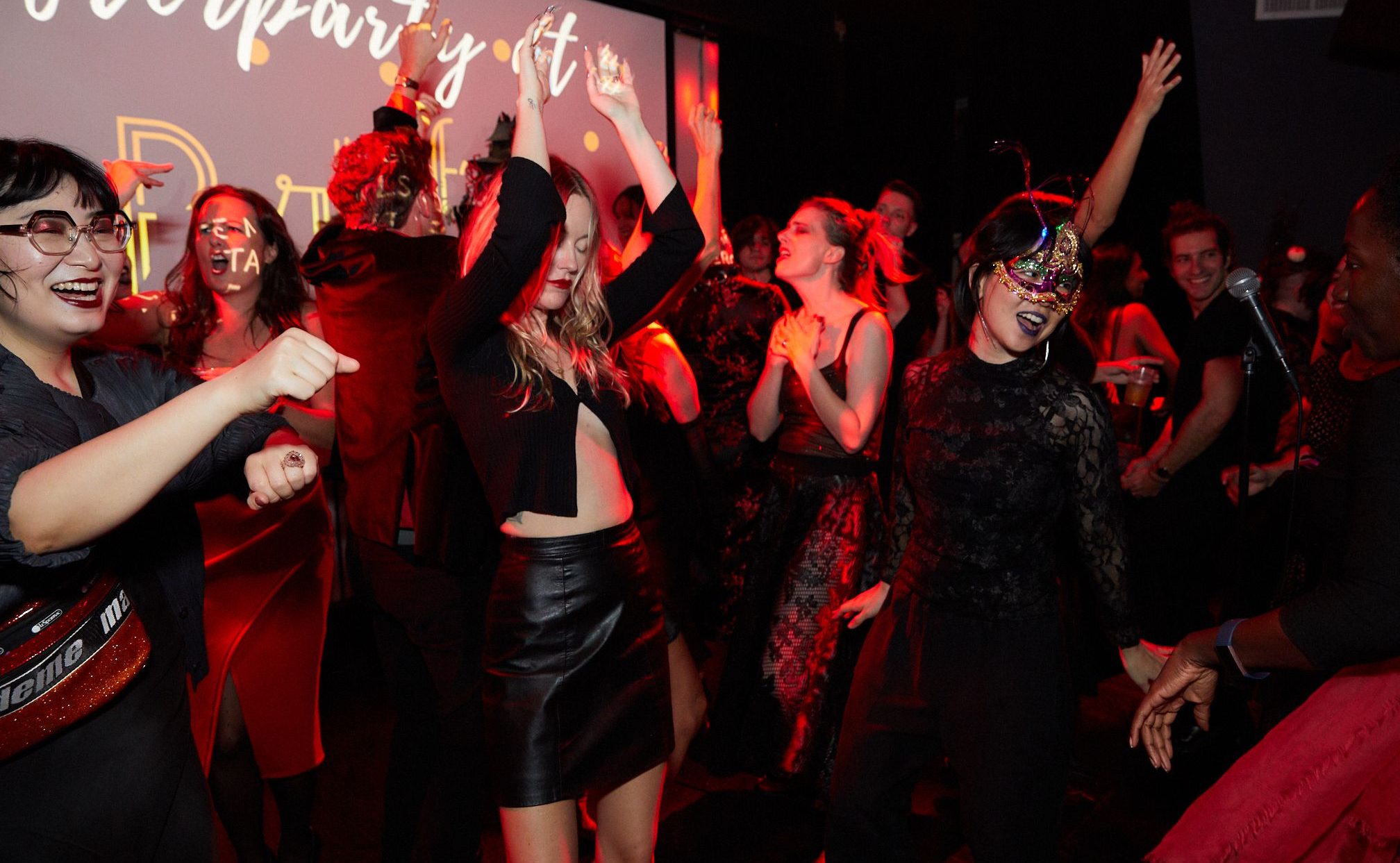news
Some Europeans at McNally Jackson

You know that joke, right? It begins like: “How many Europeans can you fit into the McNally Jackson Bookstore?” … and I promise to finish it at the end of the post.
November in New York can be pretty gloomy and depressive at times. And so was last night. Leaving one with the option of either wandering around the streets of the Lower East Side in the rain, listening to early Portishead and flirting with suicidal thoughts, or attending a reading of seven superstar European writers as part of the 7th New Europe Literature Festival. And as I have a soft spot for the new European wave in prose, the latter was my obvious choice.
Each author read a short piece in their original language, which was followed by a reading of their work in English.
Therefore, I served myself nice red wine, closed my eyes (when not taking photos) and let myself get lost in the foreign sound of a Romanian excerpt from the novel Wasted Morning by Gabriela Adamesteanu. Gabriela explains that her book contains two novels in fact. One is a historical novel set during World War II. and the second is a contemporary story of two women, one being very pragmatic, the other emotional. She reads about the pragmatic one.
1. “All men are the same. You shouldn’t think that one is better than another. There is something wrong with each of them.” (Gabriela Adamesteanu) 2. Antonia Arslan
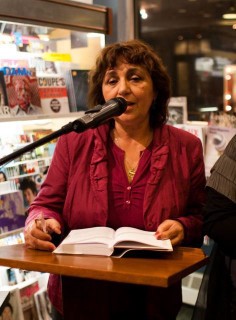
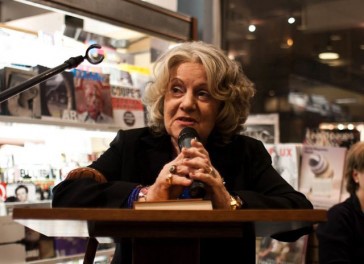
Antonia Arslan takes the stand. She is a petit Italian with an Armenian heritage. Driven by the voices of the past she wrote her novel Skylark Farm to tell one of the many stories that happened during the Armenian genocide. She is reading from a sequel of Skylark Farm that is not released in the States yet:
“Is it you who has my son?” one woman seems not to understand. Her hands are not dirty, they are covered with blue tattoos. She must be an Armenian refugee. But she’s not wearing her tattoos with pride.”
The French author Philippe Claudel looks at the packed audience in amazement: “Some people in Europe believe that Americans don’t care about European literature, but yet this room is full.” Philippe explains that in his work he wants to explore the 20th century, a century, which invented genocide and the concept of extermination. He acknowledges that many great pieces were written by authors who were personally involved in genocide, but he prefers to write about it from an indirect prospective, he wants to create a myth.
Czech Radka Denemarkova is exploring the space we are living in through a novel. She comes to a conclusion that the Central European space is a space where topics such as violence and sex are no longer taboo, which is in sharp contrast with the tabooization of certain parts in history. In her novel Money from Hitler she directly talks about the period before 1945 when Czech and Germans lived together in the Czech land. After 1945, Germans were expelled from the country. Her novel is a story written as an exaggerated grotesque about a girl who grew up in a German speaking family in the Czech land and only in a concentration camp she found out that she was Jewish. After the War was over, she had nowhere to return to, because Czechs labeled her as a Nazi, because her family spoke German.
1. Philippe Claudel. 2. “My novel is a bone stuck in one’s throat, rather than a desert after a dinner.” (Czech Radka Denemarkova)
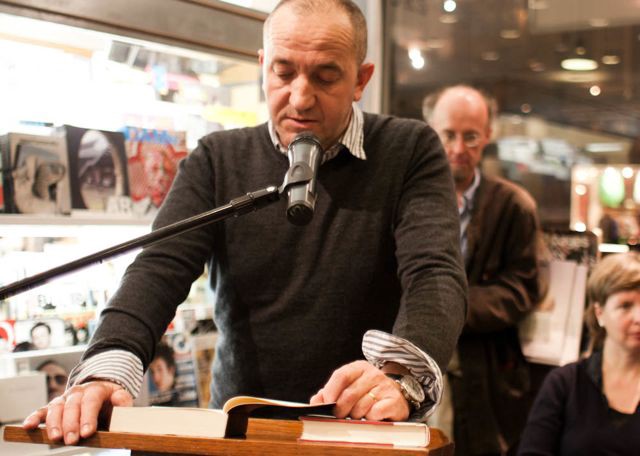

Jenny Erpenbeck is an East Berliner. In her novel Visitation, in 12 chapters, she writes about a German house close to Berlin owned by Jews and of every person that seemed to be important. Each of the chapters is very different from the other, some chapters tell the same story from a different prospective.
1. “It is certainly better to be a stranger among strangers than to be one of your kind.” (Jenny Erpenbeck) 2. Olga Tokarczuk.

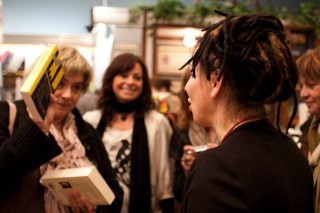
Polish writer Olga Tokarczuk seems to have the greatest fan base in the audience. No wonder, her books became cult in Poland and every school child is required to read one of her novels. She laughs that it’s a good thing for the book, because that way it gets to be in every school library. She read from her novel The Ugliest Woman in the World and proved to the audience that indeed she is a master of words:
“He looked at her thinking how could anyone be this ugly. He looked at her and imagined how it is to be her, how it is to look at the world though her piggy eyes, if they see the same things as other eyes. Some idiots gave away their fortune for beautiful women… Not him, he would marry the world’s ugliest woman and she will love him as a pet.”
1. “Your birth is real to me… Even though you were born in 13 and over a pizza. Just like that.” (Kirmen Uribe) 2. Audience.

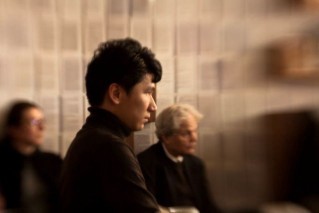
A poem read in Basque by Kirmen Uribe, a Spanish writer, is part of his novel Bilbao-New York-Bilbao. Kirmen explains that it is a novel about a writer on the flight from Bilbao to New York thinking about his yet unwritten novel. It will be an unconventional novel about three generations full of emails, poems and Wikipedia articles.
So how does that joke go again?
–Katarina Hybenova is a writer and a photographer based in Brooklyn, the author of www.bushwickdaily.com







